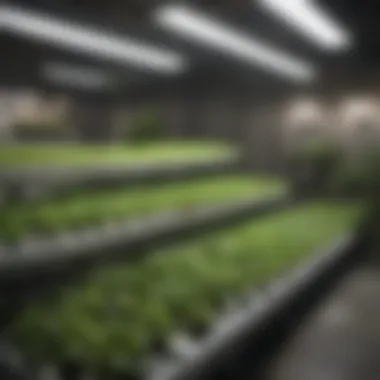Hydroponic Shops: Your Guide to Sustainable Gardening


Intro
In recent years, the conversation surrounding sustainable agriculture has transformed from a niche interest into a mainstream topic. The resurgence of interest in eco-friendly gardening practices, especially those that cater to urban populations with limited space, has introduced many enthusiasts to the wonders of hydroponics. Hydroponic shops are emerging as essential local resources, offering tools, knowledge, and community support for this innovative form of agriculture. As the quest for fresh produce and self-sufficiency gains more traction, these shops stand at the intersection of consumer needs and sustainable practices.
Exploring the offerings of hydroponic shops not only reveals a treasure trove of gardening solutions but also underscores their importance in the broader context of environmental responsibility. By encouraging local gardening, these establishments help reduce carbon footprints associated with transporting food and promote biodiversity in our diets. With this newfound awareness, local growers are seeking out hydroponic resources, eager to adopt techniques that enhance growth while conserving vital resources like water and land.
As we dive deeper into what hydroponic shops provide, it becomes clear that the significance of these local hubs goes far beyond selling products; they contribute meaningfully to a sustainable future. Whether you're a seasoned gardener or just starting out, understanding what these shops have to offer is key to thriving in the world of hydroponics.
Intro to Hydroponic Gardening
Hydroponic gardening is not merely a trend; it represents a significant shift in the way we approach cultivation. For those engaged in sustainable horticulture, understanding hydroponics is essential. It offers practical solutions to a variety of needs—space limitations, resource scarcity, and a desire for fresher produce. This article unfolds the various layers of hydroponic gardening, with an emphasis on the roles of local hydroponic shops.
Definition and Key Concepts
So, what exactly is hydroponics? At its core, hydroponics is the method of growing plants without soil, using nutrient-rich water instead. This technique relies on a carefully balanced system of providing the right nutrients directly to the plant roots, promoting efficient growth. Hydroponics allows cultivators to maximize yield in relatively small areas, which is particularly beneficial in urban settings where space is at a premium.
Some key concepts to note include:
- Nutrient Solutions: Essential for plant growth, these solutions supply necessary minerals and vitamins.
- Growing Media: While not always soil, various substrates like coconut coir or perlite are often used to support the plant's roots.
- Water Quality: Not all water is created equal; understanding pH and EC (electrical conductivity) is crucial for success.
The beauty of hydroponics lies in its versatility. It can cater to everything from hobbyists with a small indoor setup to commercial operations producing large quantities of food.
Historical Context of Hydroponics
To appreciate hydroponics, it's important to look back at its roots. The concept of growing without soil dates as far back as the Hanging Gardens of Babylon. However, modern hydroponics started gaining traction in the 1930s when researchers began experimenting with soilless growing techniques in agricultural laboratories.
In the mid-20th century, techniques were applied more widely, especially in arid regions where traditional farming was impractical. Today, hydroponics is at the forefront of sustainable agriculture, with innovations constantly emerging to improve cultivation efficiency.
The method is particularly relevant as we face challenges such as climate change and an increasing global population. Hydroponics not only maximizes space but also conserves water—an invaluable feature in today’s context. By recognizing its historical significance and current relevance, we can better understand the emergence of hydroponic shops as vital resources for both novice and experienced gardeners alike.
The Role of Hydroponic Shops
The significance of hydroponic shops lies in their unique position as local hubs for sustainable horticulture. They not only provide essential supplies and equipment but also serve as vital sources of knowledge and community support for both novice and experienced gardeners. The convenience and accessibility of these shops make them indispensable for those venturing into hydroponic gardening.
What to Expect from a Hydroponic Shop
When walking into a hydroponic shop, you might feel like a kid in a candy store, overwhelmed by the array of colorful products and potential gardening tools. These shops typically carry an extensive range of items that cater to various aspects of hydroponic systems. Here’s a glimpse of what to find:
- Growing Systems: From deep water culture to aeroponics, a variety of setups can satisfy different scales and styles of growing.
- Nutrient Solutions: A wide selection of fertilizers and nutrient mixes tailored for hydroponically grown plants can directly impact growth and yield.
- Seeds and Clones: Many shops provide not only seeds but also young plants, giving you a head start on your hydroponic journey.
- Growing Media: Materials like rockwool, clay pellets, and coco coir are available to help with plant support and sustenance.
Moreover, staff expertise is often a key advantage. Employees are usually well-versed in hydroponic systems and can offer personalized advice tailored to your specific needs, making sure you get the best setup for your plants.
Importance of Local Retailers
Choosing to shop at local hydroponic stores can be a game-changer for sustainable agriculture. Supporting local retailers means you’re not just purchasing products; you’re investing in your community. Here’s why this matters:


- Economic Vitality: Local shops contribute to the economic health of a community by creating jobs and keeping money circulating within the area.
- Tailored Offerings: Local retailers may stock products that are particularly suited for the local climate and conditions. Their understanding of the regional agricultural landscape can lead you to better buying decisions.
- Community Knowledge: These shops often foster a sense of belonging. They may host workshops and events, creating a space where enthusiasts can share tips and experiences. For instance, a local gathering might spark an idea for a unique growing solution or simply provide a platform for networking with like-minded individuals.
"Local hydroponic shops play a vital role not only in providing supplies but in building the community around sustainable gardening."
By choosing to purchase from local hydroponic shops, you’re doing more than just buying supplies; you’re enriching your own gardening experience while supporting vital local ecosystems. With each visit, you not only stock up on what you need but also engage with a community passionate about sustainable horticulture.
Key Products Offered in Hydroponic Shops
When wandering through the aisles of your local hydroponic shop, you’ll stumble upon a treasure trove of products designed to enhance your growing experience. The assortment of items available reflects the diverse needs of hydroponic gardeners, whether you're a seasoned pro or just dipping your toes into the soil-less landscape. Finding the right products can significantly boost the efficiency and outcomes of your gardening techniques. This section sheds light on several critical categories of products that you might find in these shops, their unique features, and what makes them essential for the modern gardener.
Growing Systems and Equipment
Growing systems form the backbone of any hydroponic setup, and choosing the right system can make or break your gardening endeavors. Different systems cater to varying plants and growing environments, ensuring that every gardener can find a suitable solution.
Deep Water Culture Systems
Deep Water Culture (DWC) systems involve suspending plant roots in a nutrient-rich solution while allowing oxygen to circulate around the roots. This technique is renowned for its simplicity and effectiveness in growing fast-growing plants, such as lettuce and herbs. The key characteristic of DWC systems is their ability to deliver nutrients directly to the roots, maximizing growth potential. One major advantage is the reduced water usage compared to traditional soil gardening, making it an eco-friendly option.
However, DWC systems can require attention to pH levels and oxygenation, as roots submerged too deeply may suffer from oxygen deprivation. But for those capable of managing these nuances, DWC sets the stage for lush, rapid growth.
Nutrient Film Technique Systems
The Nutrient Film Technique (NFT) system takes a slightly different approach by allowing a thin film of nutrient solution to flow over the roots of the plants. This method enables roots to absorb the nutrients they require while also receiving oxygen from the air. One standout feature of NFT is its high efficiency in nutrient usage, potentially leading to faster growth rates. This makes it a popular choice for more experienced growers looking to maximize their yields.
The downside? NFT systems can be sensitive to power outages; if you lose electricity, the nutrient flow stops and can lead to crop failure unless there's a backup. Still, they remain a favored method for growing many types of plants, giving gardeners a dynamic option for their setups.
Vertical Farming Solutions
As urban spaces become more crowded, vertical farming solutions have bloomed in popularity. These systems stack multiple layers of growing platforms, allowing for the cultivation of crops in smaller areas, which maximizes space efficiency. The hallmark of vertical farming is the integration of technology—often combining LED lights, misting systems, and hydroponic techniques to create a mini-ecosystem that can flourish indoors or in limited outdoor spaces.
While vertical farms can be a powerful solution for urban gardening, they can also require a higher initial investment and more complex maintenance. Nonetheless, the ability to produce food right in your home or on your rooftop can be incredibly rewarding, making it an appealing option for those committed to sustainability.
Nutrient Solutions and Fertilizers
Every gardener knows that plants need nutrients to flourish. Hydroponic systems rely heavily on liquid nutrient solutions, which often contain essential elements like nitrogen, phosphorus, potassium, and trace minerals. These solutions are specifically formulated to meet the unique nutritional requirements of plants grown without soil. Many local hydroponic shops offer various brands and formulations, allowing you to select solutions that fit your plant types and growth stages.
Seeds and Clones Available
While some may think that hydroponic gardening starts and ends with systems, having the right seeds or clones is equally significant. Hydroponic shops often house a range of organic seeds and starter plants, providing growers options suited for hydro growing conditions. It's beneficial to seek out varieties that perform well in water-based growth systems, substantially impacting your success rates.
Growing Media and Accessories
Even without soil, hydroponic gardeners need proper growing media. Many shops carry options such as coconut coir, rock wool, and clay pellets, which provide support for plants while retaining moisture and allowing for gas exchange. Accessories like pH testers, air pumps, and LED grow lights can also be found, all of which play a significant role in ensuring a thriving hydroponic environment.
By choosing the right products available in local hydroponic shops, you equip yourself with the tools necessary for successful sustainable horticulture. Each item can provide unique advantages and must be selected carefully to align with your gardening goals. The knowledge gathered from these resources not only empowers you but also contributes to the ecosystem of local agriculture, promoting a greener future.


Benefits of Shopping at Local Hydroponic Stores
When it comes to hydroponic gardening, the benefits of shopping at local hydroponic stores are manifold, particularly in supporting sustainable horticulture. These stores not only offer specialized products but also cultivate a knowledgeable community around them. By choosing to patronize local retailers, you are contributing to a larger network that champions eco-friendly farming methods. Let’s explore some of the standout advantages you can gain when you opt for a local hydroponic shop.
Expert Advice from Staff
One of the most significant perks of visiting local hydroponic stores is tapping into the experience of knowledgeable staff. Unlike big-box retailers with generic products and limited guidance, local shops often have passionate and informed employees who have hands-on experience with hydroponic systems. This expertise offers several benefits:
- Tailored Recommendations: Staff can provide you with personalized product suggestions based on your specific growing conditions or challenges.
- Problem-Solving Help: If you’re facing issues with your plants, they can help diagnose problems and suggest solutions, saving you time and frustration.
- Workshops and Training: Many hydroponic shops offer workshops on various gardening techniques, which serves both beginners and seasoned gardeners alike. These instructional sessions can open doors to new techniques and methodologies.
By engaging with experts, you arm yourself with knowledge that can significantly enhance your gardening practices.
Support for Local Agriculture
Shopping at hydroponic stores supports not only your gardening endeavors but also the entire local agricultural ecosystem. Local shops often partner with regional growers to sell locally produced seeds, clones, and other supplies. This interconnected approach offers several advantages:
- Sustainability: Purchasing from local shops reduces transportation emissions, contributing to a smaller carbon footprint.
- Strengthening the Community: Local businesses are pivotal for economic health, often reinvesting in the neighborhood community. When you buy from them, you help sustain jobs and encourage the growth of other local enterprises.
- Biodiversity: Local hydroponic shops may carry seeds that are well-adapted to the regional climate, promoting biodiversity and further supporting local ecosystems.
By choosing to shop locally, you are not merely indicating your preference for fresh produce; you are also aiding the movement for sustainable agricultural practices.
Community Engagement and Events
Local hydroponic stores often serve as community hubs, facilitating events and gatherings that foster camaraderie among gardening enthusiasts. Participating or attending these events can yield several benefits:
- Networking Opportunities: Meet fellow gardeners, share tips, and potentially collaborate on future projects. It’s a chance to build a supportive network.
- Learning Experiences: Events often feature guest speakers or workshops, offering learning opportunities about various techniques in hydroponic gardening.
- Cultural Exchange: These events can introduce new plant varieties or innovative growing methods from other regions or cultures, further enriching your gardening experience.
Engagement in local gardening communities elevates not just individual practices but also enhances the collective knowledge of sustainable growing methods.
Finding Hydroponic Shops Near You
Finding a hydroponic shop in your area is a significant step for anyone venturing into the world of sustainable gardening. These shops offer not only essential supplies but also valuable knowledge and community support. Understanding how to locate these resources is crucial for maximizing your growing experience and can cover quite a bit of ground.
When you know where to find local hydroponic shops, it’s like having a treasure map. It can lead you to not just products but also the expertise that can enhance your success in this unique type of horticulture. Beyond merely stocking up on supplies, tapping into these local resources can really bring your gardening ambitions to life.
Utilizing Online Resources
In this digital age, online resources are invaluable for locating hydroponic shops. Websites that specialize in gardening, agriculture supplies, or even specialized hydroponic retailers can be a goldmine of information.
- Search Engines: Using simple Google searches like "hydroponic shops near me" can yield a list of local options. Don't forget to include your specific location for more tailored results.
- Maps Services: Applications like Google Maps can pinpoint exact locations, show you ratings, and often provide hours of operation.
- Company Websites: Once you've identified some shops, visit their websites to see what they offer, stock availability, and any upcoming events or workshops.
This kind of information can not only help you locate a shop but also give you a sense of what they specialize in.
Word of Mouth Recommendations
Nothing beats a personal recommendation. When it comes to niche markets like hydroponics, the experience and insights from fellow gardeners can be a game changer.


- Local Gardening Clubs: Engage with local gardening or hydroponics clubs. These groups are usually chock full of advice on best places to shop, and some might even have special deals with local retailers.
- Friends and Neighbors: Chat with your gardening pals or ask around in your neighborhood. You might find someone who’s already in the know about great local spots.
- Local Farmers’ Markets: Often, vendors at these markets can be great resources. They might even sell hydroponic supplies or can recommend shops that do.
Tapping into your local network can lead you to hidden gems that otherwise might not show up in online searches.
Social Media and Local Forums
Social media and online forums have become pivotal for knowledge sharing in the gardening community. They are dynamic platforms where you can connect with others who share your interests.
- Facebook Groups: Join local gardening groups where discussions often revolve around hydroponics. Many shops participate in these communities and may post about promotions or events.
- Reddit: Check out subreddits focused on gardening, such as r/hydroponics—it’s a place where discussions and recommendations flow like water. You can ask questions, get tips, and find shops recommended by other enthusiasts.
- Instagram: Follow hydroponics-related accounts to stay updated on popular practices and local supply shops. Often, users will tag their favorite shops, providing you with immediate leads.
Engaging in these social spaces can take your search to new heights, connecting you with a community that enriches your knowledge and growing journey.
Finding hydroponic shops isn't just about supplies; it's about building connections with a community that shares your passion for sustainable growth.
Challenges in Accessing Hydroponic Supplies
Explaining the addequate availability of hydroponic supplies is crucial for anyone stepping into this growing field. While hydroponics offers an innovative approach to gardening, accessing the necessary materials can be a tricky business. Understanding these hurdles helps enthusiasts and professional gardeners plan effectively and ensure a fruitful growing experience.
Limited Availability of Specific Products
One of the major challenges that hydroponic gardeners face is the limited availability of specialized products. Local hydroponic shops may offer a range of equipment and supplies, yet not all items are accessible at any given time. Individual plants have unique needs, and the right apparatus is essential for success. For example, one might search for a specific nutrient solution that targets deficiencies in the plants they're growing, only to find it out of stock.
This scarcity can lead to frustration, especially when it's critical to maintain a consistent nutrient regimen. In some regions, the number of hydroponic suppliers is quite limited, and their inventory may be heavily influenced by the popularity of certain crops or gardening styles. If supply is sluggish or inconsistent, gardeners can easily find themselves scrambling, which can impede their plans.
At times, it’s not just what’s available, but also the variety. Hydroponics thrives on different growing techniques that require different equipment. Without the right options, the broad appeal of hydraponic gardening becomes significantly hindered as gardeners might not be able to experiment or even operationalize their designs. Customers might find themselves resorting to online shopping, which, while it offers a broader selection, frequently comes with shipping delays and added costs.
Regional Variability in Shop Quality
Another layer of complexity is the varying quality found among hydroponic shops, influenced largely by location. Some cities may boast several highly-rated retailers with top-notch customer service and extensive knowledge. Meanwhile, others may have just one or two shops that don't provide the same level of satisfaction or reliability.
It’s worth noting that not all hydroponic shops are created equal. The staff experience can wildly differ between them, which can affect the level of support and information available. An inexperienced staff member may miss providing valuable tips that could guide a novice gardener toward growth success. This regional variability means that some areas may simply lack the resources or expertise required to support a thriving hydroponic community.
Moreover, smaller towns might lack specialized hydroponic shops altogether, pushing enthusiasts to larger cities or prompting them to rely on online vendors. But even then, navigating online marketplaces can feel like looking for a needle in a haystack, as the quality and shipping of products can widely differ.
"Navigating through the complexities of hydroponics may feel daunting, but being prepared for the challenges will give you a fighting chance in this unique gardening journey."
Culmination
The dialogue on hydroponic shops is vital to understanding the evolving landscape of sustainable horticulture. With the increasing awareness around environmental issues, these local resources are not just about buying seeds or systems; they represent a movement toward greener practices. In the wake of global challenges like food scarcity and climate change, accessing hydroponic expertise and supplies becomes crucial.
The Future of Hydroponic Retail
As we peer into the future, the hydroponic retail environment seems ripe for transformation. Many shop owners are starting to realize the potential of harnessing technology to enhance customer experience. Imagine a scenario where a hydroponic shop offers virtual reality setups to show potential gardeners how their systems will function in actual spaces. Trends show a growth in online sourcing, but this doesn't eliminate the necessity for local shops.
Moreover, partnerships between hydroponic retailers and local farms are becoming more common. These collaborations not only enable farmers to access high-quality products but also create a community atmosphere where knowledge is shared. In addition, more educational workshops and community events are likely to take place in these shops, nurturing a sense of camaraderie among gardeners. By embracing digital platforms while maintaining their physical presence, hydroponic shops will surely find a way to thrive in the industry.
Encouraging Sustainable Practices
The push for sustainable practices remains intertwined with the existence of local hydroponic shops. Key to their mission is fostering a culture of eco-awareness among patrons.
- Education is pivotal. Shops can introduce programs emphasizing the importance of water conservation, nutrient cycling, and organic pest control. Workshops can lead to hands-on experiences, guiding enthusiasts on how to balance productivity with sustainability.
- Showcasing local produce can also be a great way to inspire shop visitors. Having seeds and plants sourced locally can demonstrate the vital role of regional biodiversity in hydroponic gardening. This not only supports local farmers but also showcases how communities can thrive with sustainable practices.
- Finally, promotional campaigns may help drive commitment toward greener methods. Incentives for using eco-friendly products, recycling containers, or adopting energy-efficient systems could stimulate a culture of responsibility among gardeners. As hydroponic shops transform into hubs of sustainable practice, they will significantly impact how we view horticulture in our daily lives.
This landscape of local hydroponic shops represents a rich resource base, nurturing not just plants, but individuals and communities toward a more sustainable future.



